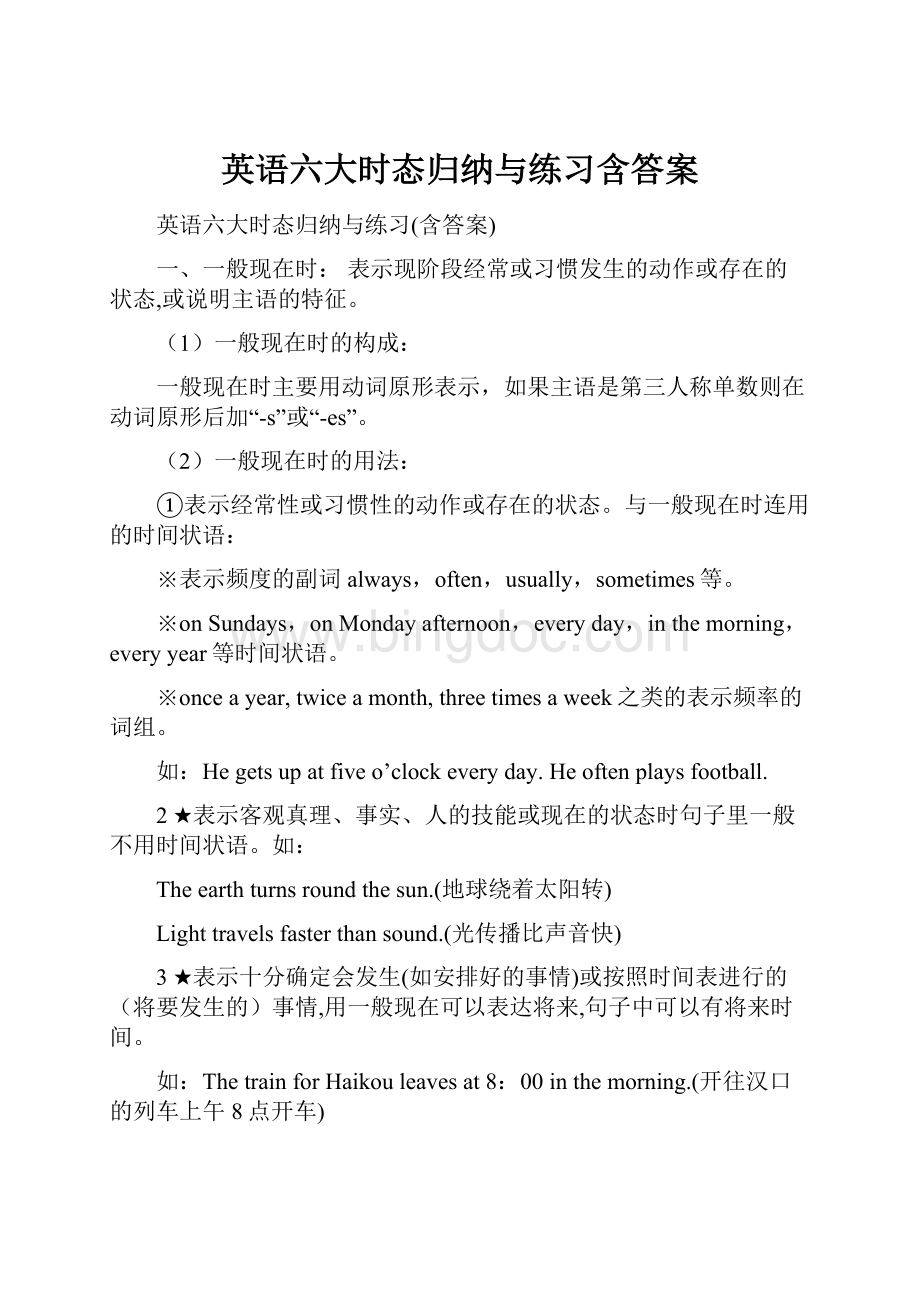英语六大时态归纳与练习含答案.docx
《英语六大时态归纳与练习含答案.docx》由会员分享,可在线阅读,更多相关《英语六大时态归纳与练习含答案.docx(17页珍藏版)》请在冰点文库上搜索。

英语六大时态归纳与练习含答案
英语六大时态归纳与练习(含答案)
一、一般现在时:
表示现阶段经常或习惯发生的动作或存在的状态,或说明主语的特征。
(1)一般现在时的构成:
一般现在时主要用动词原形表示,如果主语是第三人称单数则在动词原形后加“-s”或“-es”。
(2)一般现在时的用法:
①表示经常性或习惯性的动作或存在的状态。
与一般现在时连用的时间状语:
※表示频度的副词always,often,usually,sometimes等。
※onSundays,onMondayafternoon,everyday,inthemorning,everyyear等时间状语。
※onceayear,twiceamonth,threetimesaweek之类的表示频率的词组。
如:
Hegetsupatfiveo’clockeveryday.Heoftenplaysfootball.
2★表示客观真理、事实、人的技能或现在的状态时句子里一般不用时间状语。
如:
Theearthturnsroundthesun.(地球绕着太阳转)
Lighttravelsfasterthansound.(光传播比声音快)
3★表示十分确定会发生(如安排好的事情)或按照时间表进行的(将要发生的)事情,用一般现在可以表达将来,句子中可以有将来时间。
如:
ThetrainforHaikouleavesat8:
00inthemorning.(开往汉口的列车上午8点开车)
④★在时间状语从句中(以when,after,before,while,until,assoonas等引导)和条件状语从句中(以if,unless引导),用一般现在时代替一般将来时,句子可以有将来时间。
如:
PleaseringmeupassoonasyouarriveinGermany.(你一到德国就给我打电话)/Ifitrainstomorrow,wewillhavetostayathome.(如果明天下雨我们就只好呆在家)
⑤★一般现在时用于倒装句中可以表示正在发生的动作,动词以come,go为主。
如:
Herecomesthebus.(车来了)/Theregoesthebell.(铃响了)。
⑥一般现在时常用于体育比赛的解说或寓言故事中。
Nowthemidfieldplayercatchestheballandhekeepsit.
二、一般过去时:
表示过去某时发生的动作或状态,这种动作或状态可能是一次性,也可能经常
发生。
(过去常常做某事也可用usedtodosth来表示)
1表示过去具体时刻发生的一次性动作时,
时间状语有:
at(eight)(yesterdaymorning),(tenminutes)ago,yesterday,lastweek,someyearsago,in1995,inthepast,theotherday,atthattime,justnow等。
※when引导的时间状语从句。
如:
Igotupat6:
00thismorning.(我是早上六点钟起床的)
LittleTombrokethewindowathalfpastninethismorning.
Whenhewentintotheroom,hesawastrangertalkingwithhisfather.
Hecametoourcityintheyear2000.(他2000年来到我们市)
2表示过去一个阶段中经常发生的事情时,
时间状语有:
last…,in…,from…to…,for(10years),often,usually,sometimes,always,never等。
如:
MrJacksonusuallywenttoeveningschoolswhenhewasyoung.
3讲故事、对过去经历的回忆、双方都明白的过去事件等一般用过去时,而且经常省略时间状语。
如:
IhappenedtomeetRoseinthestreet.(我正好在街上遇到露西)
★注意:
有一些容易变化错误的单词,如:
prefer→preferred,fix→fixed,mix→mixed
三、一般将来时:
表示将来某一时刻或经常发生的动作或状态。
①一般将来时的时间状语有:
tomorrow,this(afternoon),next(year),oneday,soon,
someday,sometime,inthefuture,in+一段时间;when/after等引导的状语从句的主句中。
Iwillcallyouwhenmymothercomesback.
★② 用will构成的将来时,表示动作与人的主观愿望无关。
“shall”用于第一人称。
“will”用于所有人称。
如:
Iwillgraduatefromthisschoolsoon.
③表示有礼貌地询问对面是否愿意或表示客气的邀请或命令时。
(不用begoingto)
Willyoupleaselendmeyourbike?
④表示意愿时。
(不用begoingto)
Wewillhelphimifheasksus.如果他请我们,我们愿意帮助他。
⑤表示单纯性的将来,与人的主观愿望和判断无关时。
(不用begoingto)
Thesunwillriseat6:
30.太阳将在6:
30升起。
★⑥ “begoingto+动词原形”表示打算或准备要做的事情,或者主观判断即将要发生的事情或有某种迹象表明要发生的事。
It’sgoingtorainsoon.(天快要下雨了)
★⑦ 现在进行时、一般现在时也可以表示将来。
(见相应时态)
⑧ shall和will在口语的一些疑问句中相当于情态动词,表示征求对方意见或请求。
Shall一般与第一人称连用,will与第二人称连用。
如:
ShallwegotothezoonextSaturday?
(我们下周六去动物园好吗?
)
Willyoupleaseopenthedoorforme?
(替我把门打开好吗?
)
★⑨“beaboutto+动词原形”和“beto+动词原形”结构表示按照计划即将发生的动作。
如:
Tomtoldherthathewas(about)togoabroad.
四、现在进行时:
现在进行时表示现在正在进行的动作或是现阶段正发生而此刻不一定在进行的动作。
(1)现在进行时由“助动词be(amisare)+现在分词”构成。
(2)现在进行时的用法
①表示此时此刻正在进行的动作。
常与now,look,listen,atthemoment等连用。
——Whatareyoudoing?
——I’mreadingEnglish.
②表示现阶段正在进行的动作或持续的状态。
常与thesedays等时间状语连用。
Theyarestudyinghardthisterm.他们这学期学习一直很努力。
Myfatheriswritinganovelthesedays.
★(3)位移动词:
go,come,leave,stay,start,begin等,常用进行时表将来。
表示即将发生或安排好要做的事情。
WeareleavingforLondonsoon.我们很快就要动身去伦敦了。
Sheisgoingtheretomorrow.她明天要去那里。
I’mcomingnow.(我就来)
★(4)表示频繁发生或反复进行的动作,常与always等频度副词连用,以表示赞扬、不满或讨厌等感情色彩。
如:
Heisalwaysborrowingmoneyfrommeandforgettingallaboutitafewdayslater.
★(5)但应注意下列这些动词一般不用于现在进行时态的句子中。
A、表示感觉的动词。
如see,hear等。
B、表示喜欢或厌恶的动词。
如like,love,hate等。
C、表示希望的动词。
如want,wouldlike等。
D、表示状态的动词。
如be等。
E、表示归属的动词。
如have等。
F、表示思维、知识或理解能力的动词。
如know,think,forget等。
(6)特别注意:
Look!
Therain_______(stop).答案[hasstopped]
Look!
Thesun________(rise).答案[hasrisen]
五、过去进行时:
过去进行时表示过去某一时刻或某阶段正在进行的动作。
①过去进行时由“was(第一、三人称单数)或were(第二人称单数和各人称的复数)+现在分词”构成。
2过去进行时的时间状语有:
then,atthattime,thistimeyesterday,at(eight)yesterday(morning),以及由when/while引出的时间状语从句。
如:
Hewascookingsupperthistimeyesterday.(昨天这个时候他正在做晚饭)
ThelittlegirlwasplayingwithhertoywhenIsawher.
3用于宾语从句或时间状语从句中,表示与主句动作同时进行而且是延续时间较长。
句子中通常不用时间状语。
如:
Shesawithappenwhenshewaswalkingpast.(她路过时看到事情的发生)/FatherwaswatchingTVwhilemotherwascookingsupper.
★④也可以表示过去一个阶段频繁发生或反复进行的动作,常与always等频度副词连用,以表示赞扬、不满或讨厌等感情色彩。
如:
Hewasalwaysborrowingmoneyfrommewhenhelivedhere.(他住在这里老时向我借钱)
六、现在完成时:
现在完成时表示一个发生在过去的、对现在仍有影响的动作,或表示开始在过去,并且一直延续到现在,甚至还可能延续下去的动作。
①在完成时由“助动词have(has)+动词的过去分词”构成。
②表示发生在过去的对现在仍有影响的动作时,时间状语有:
already,yet,just,once,twice,ever,never,threetimes,before等。
如:
Ihaveneverseensuchfinepicturesbefore.(我以前从来没有看过这么好的画)HehasjustgonetoEngland.(他刚去英国)
★③表示在过去开始一直延续到现在(可能延续下去)的动作或状态时(肯定句或疑问句中动词必须用延续性动词),时间状语有:
for(twoyears),since1990,since(twoweeksago)和since引导的状语从句。
如:
Ihavebeenawayfrommyhometownforthreeyears.(我离开家乡有3年了)
=Ihavebeenawayfrommyhometownsincethreeyearsago.
=Ihavebeenawayfrommyhometownsince2005.
=Itis3yearssinceIleftmyhometown.
4口语中havegot往往表示have(有)的意思。
如:
Theyhavegotthousandsofbooksintheirlibrary.(他们图书馆有上万本书)
★⑤havebeento与havegoneto的区别:
havegoneto(“已经去了”)表示人不在这里,havebeento(“去过…(次)”)表示人在这里。
如:
--WhereisMrLi?
–HehasgonetotheUK.(李先生在哪里?
他去了英国。
)IhavebeentoBeijingthreetimes.(我去过那里三次。
)
★⑥在完成时中,一个瞬间性动词(一次性动作)不能与表示一段时间的状语连用,此时须将该瞬间动词改为延续性动词或状态动词。
come→behere,go→bethere,die→bedead,borrow→keep,buy→have,join→bein(bea…member),leave→beaway,begintostudy→study等。
如下图:
或者使用下面这个句型:
Itis/hasbeen+(多久)+since+主语(人)+谓语(过去时)+……+过去时间状语
[注意]在其它的时态中也存在类似问题,记住,关键是:
瞬间动词不能和表达一段时间的状语连用。
如:
HowlongmayIkeepthebook?
(这本书我能借多久?
)(句子中keep取代了borrow)
一般过去时专练
()1.Themotheraskedtheboy_______downtheladder,buthewenton_______instead.
A.come;climbingB.tocome;toclimb
C.tocome;climbingD.coming;climbing
()2.Theteacheraskedthestudentstoclosethewindows_______thewindfrom_______thepapersaway.
A.tostop;blowingB.stopping;blowing
C.tostop;blowD.stopped;blow
()3.Thesickmanstayedinbed,_______veryterrible.
A.feltB.feelingC.isfeelingD.wasfeeling
()4.YesterdayIheardastory_______bymyfriend.
A.toldB.tellingC.totellD.tell
()5.Theboywasmade_______thereforanhourbyhisfather.
A.standingB.standC.tostandD.stands
()6.Isawhim_______intothesmallstore.
A.wentB.goingC.togoD.hasgone
()7.Heraisedhisvoicetomakeeverybodyintheroom______himclearly.
A.hearB.tohearC.hearingD.heard
()8.Ourgeographyteachertoldusyesterdaythattheearth_______aroundthesun.
A.wasmovingB.movedC.hasmovedD.moves
()9.Oh,it’syou.I’msorryI_______knowyou_______here.
A.don’t;areB.didn’t;areC.didn’t;wereD.don’t;were
()10.MrLuXundiedin1936.He_______alotoffamousnovels.
A.wroteB.waswritingC.haswrittenD.wouldwrite
()11.---Howwasyourweekendonthefarm?
---Great!
We_______withthefarmers.
A.enjoyourselvesB.wentfishingC.willworkD.makefriends
()12.---WhatdidMrJonesdobeforehemovedhere?
---He_______acitybusforovertwenty-fiveyears.
A.isdrivingB.droveC.hasdrivenD.drives
()13.Jane_______anewdresseverymonthwhenshewasinShanghai.
A.buysB.isbuyingC.boughtD.willbuy
()14.---LiuMeican’tcometonight.
---Why?
Butshe_______meshewouldcome.
A.tellsB.toldC.istoldD.hadtold
()15.Heturnedoffthelightandthen_______.
A.leavesB.hasleftC.willleaveD.left
一般过去时专练
1-5CABAC6-10BADCA11-15BBCBD
一般现在时与现在进行时专练
()1.Fatherusually______hisnewspaperafterdinner.
A.readB.readsC.readingD.isreading
()2.TheBlacksoften______tothecinemaonSaturdayevenings.
A.goB.goesC.isgoingD.aregoing
()3.Look!
Theboy______withhismotherinthepool.
A.isswimmingB.isswimmingC.areswimmingD.areswiming
()4.---WhatisTomdoingintheclassroom?
---He______somethingontheblackboard.
A.drawsB.drawC.isdrawingD.aredrawing.
()5.OldTomusually______upatsixand______sportsinthegarden.
A.gets,dosB.gets,doesC.get,doesD.gets,do
()6.It’steno’clockandJack______still(仍然)______hishomework.
A.is,doB.is,doingC.are,doD.are,doing
()7.Thewaiters______toworkatfiveeverymorning.
A.startB.startsC.startingD.arestarting
()8.I______aletter,soIcan’tgooutwithyou.
A.iswritingB.amwritingC.amwriteingD.amwritting
()9.Ahundreddays_____quitealongtime.
A.isB.areC.haveD.has
()10.--______lateforthemeetingnexttime.–Sorry,Iwon’t.
A.Don’tB.Don’tbeC.Won’tbeD.Benot
()11.Mymother_____noodles,butmyfather______.
A.likes,doesn’tB.don’tlike,doC.likes,didn’tD.didn’tlike,do
()12.Thepicture______nice.
A.looksB.islookedC.lookD.islooking
()13.ThestudentswillgototheSummerPalaceifit______tomorrow.
A.don’trainB.doesn’trainC.won’trainD.isn’train
()14.Wearealwaysready_______others.
A.tohelpingB.tohelpC.helpD.helping
()15.Ioftenhearher______abouttheboy.
A.talkingB.talkC.totalkD.talked
()16.He’salreadyalittleweakinChinese,______he?
A.isB.isn’tC.hasD.hasn’t
()17.Potatoesare______inthefieldbythefarmers.
A.growB.growingC.grownD.grew
()18.Doesshehaveawatch?
–Yes,she______.
A.haveB.doC.hasD.does
()19.She_____Englishverymuchnow.
A.islikingB.likesC.likedD.isteaching
()20.Shehasnopaperto_____.Whynotgivehersome?
A.writeB.bewritingC.writeonD.writein
( )21.DoesMrKnow-allknow______keys?
A.tomakeB.howtomakeC.howmakeD.making
()22.Doesyourmother______Englishnow?
A.